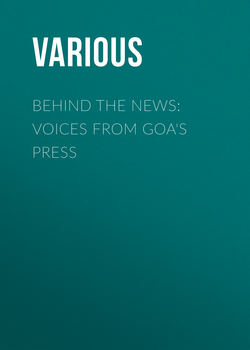Читать книгу Behind the News: Voices from Goa's Press - Various - Страница 9
Chapter 2: Goan journalism: Views from near and far
On holiday
ОглавлениеJust after a year's stay in Canada, I came to Goa on a holiday. One fine day, Fulgencio Rodrigues, once the leader of the toddy-tappers association and a candidate for the assembly, and a fellow-villager in Bogmallo, came to my house and told me that Umaji Chowgule wanted to meet with me.
I was taken aback as I didn't know Umaji personally. Rodrigues, who worked for the Chowgules, took me on his scooter to meet him Umaji at the Chowgule offices. To my surprise, he offered me a job as joint editor of a sports daily the Chowgules were then planning on launching. The other editor was to be Antonio Botelho, a former sports writer at The Navhind Times, who I knew well, both as writer and later as one of the office-bearers of the Goa Football Association.
I was a landed immigrant in Canada and my first experience in Canada was not very good. There was recession then on and I was finding it difficult to get a job in my field. I worked in a warehouse for sometime, making enough money to buy a ticket to India.
The offer came with a flat in the Sant Inez locality of Panaji and a car. I told Umaji that if I accept the position, I would forfeit my landed immigrant status in Canada. I asked if what would happen if the paper failed to fly. He said he would absorb me in the public relations department of the Chowgules. I went to Sant Inez with one of the Chowgule officers to select a flat. I picked one. After that I went to the Gomantak building to meet with Narayan Athawale, editor of Gomantak . Umaji had explained that Athawale would be the overall in charge of the new paper.
After speaking to Athawale, I met some workers. I noticed some tension among them regarding the launch of a new paper. The workers felt that profits from the Gomantak paper would be diverted to sustain the new sports daily. In other words, the workers would get lesser bonuses. The atmosphere in the press seemed vitiated. I was also aware of what happened to Evagrio Jorge. I was contemplating whether I should risk my Canadian immigration to remain in Goa. My heart and mind was divided, and so was my family. My dad said I should stay back as the job prospects in Canada very dim, but my mom said I should go back and see what the future holds.
At the same time I was engaged and in a week or two would get married. My future wife insisted that I forego the offer and return to Canada. I gave the whole thing a good thought and decided to tell Umaji that I was not interested. He had told me that if I decide to accept the offer, I should finally meet Ramesh Chowgule who, I think, was the managing director of the Chowgule group. I believe the paper was never launched. To this day, I am not sure how the Chowgules came to know about me. My hunch is that Prashant Joshi, former official of the Goa Cricket Association, whose family owns the Joshi and Sons Auto Center in Vasco, told Umaji about me. I had gone to visit Joshi in Vasco when I came to Goa.
During my next visit to Goa, I was happy to know that one of my colleagues at Free Press Journal, Padiyar, was editor of The Navhind Times with another former colleague, M.M. Mudaliar, as his associate. In fact, Mudaliar was passed over by the management after Bikram Vohra left to go to Khaleej Times in Dubai. Mudaliar and me had lunch one day in a Panaji restaurant and he seemed quite distraught. Padiyar, who joined The Navhind Times from The Times of India where he had moved from Free Press Journal, had a brief stint as editor as he passed away following a heart attack.
I knew the publisher of The Navhind Times, Vilas Sardesai, well because of his involvement with soccer. Once when I was in Goa, he, D'Cunha and I travelled in a car he borrowed from Vohra, as his own car was unavailable, all the way from Panaji to Margao to watch a soccer match. I never asked Sardesai for a favour to get me a job at The Navhind Times. I was content working in Mumbai where journalism flourished those days and continues to do so till today.
